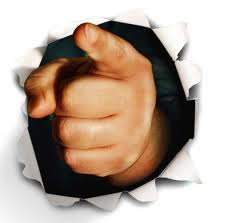The Blame Game – Pt 1
IN SHORT: There are no winners when we play the Blame Game. If you want to win, you need to stop playing!
“The world is passing through troublous times. The young people of today think of nothing but themselves. They have no reverence for parents or old age. They are impatient of all restraint. They talk as if they knew everything, and what passes for wisdom with us is foolishness with them. As for the girls, they are forward, immodest and unladylike in speech, behaviour and dress.”
[Commonly attributed to Peter the Hermit,
11/12th-century French priest & pilgrim]
“It’s all the parents fault – decent parents wouldn’t raise their kids to do that sort of thing!”
“I say it’s down to the government. If there weren’t so many cuts being made, there would be jobs for them.”
“The blame lies squarely on their own shoulders. They could’ve chosen not to, but instead they joined in. They have no-one to blame but themselves.”
You probably heard, saw or read many similar responses to the riots a few weeks back, with people trying to make sense of it all and doing what most of us naturally do as a first step when there’s a problem – look for someone to blame. We want to know who we can point the finger at, who we can hold responsible and accountable for it, who to direct our anger, our disappointment or frustration at.
And in finding someone to legitimately blame, what we’re also seeking is someone to hold responsible for putting things right so it doesn’t happen again. This is the basic rule of
THE BLAME GAME
i.e. when we find someone to blame, we’ve found someone who has to put it right. Not us, them.
Basically, we play the blame game so we can be lazy.
With the riots, various groups want parents to raise their children better (whatever ‘better’ may mean…), they want governments to improve social mobility and young people’s prospects, they want the police to take a stronger and at the same time a more compassionate approach, they want the ‘youth’ to be punished severely enough to deter others from acting in the same way.
However what really struck me about the riots was something else: the large groups of people who simply got together to clean up the damage and assist those who’d lost possessions, homes and livelihoods, and did so a little more quietly without making a huge fuss or seeking the limelight.
While the ‘blamers’ were venting their frustration and anger by directing it at others, the ‘cleaners’ were directing their energy into something altogether more immediately useful.
Whilst in many circumstances anger is a valid and totally understandable response, vented anger accomplishes nothing except generating more anger and resentment – research is fairly conclusive on that matter. During the riots many people lost property and some lost entire family businesses and even family members and had every right to be angry, but let’s imagine for a moment that no-one sought to help in the aftermath, and instead everyone used their anger in playing the blame game. What would that be like?
I imagine that the streets would still be littered with debris, shop-fronts still destroyed, burn-out and overturned cars left in the roads. It would all serve as a pervasive reminder of the violence, hurt and loss, keeping the embers of anger burning, just waiting for the next harsh word or pointed finger to fan them back into roaring flame and set the cycle repeating itself. Nothing less than a war zone would result, and you only have to take a cursory look back into world history to realise that’s exactly what’s happened time and time again.
Now, take a moment to imagine instead that the blame game was set aside and all efforts and energy were focused on cleaning up the mess, soothing hurts as best as they could be for now, recovering losses, and setting the environment back to it’s former state, or at least as close as possible.
As you imagine that, the realisation will also come that ‘cleaning’ first instead of ‘blaming’ will be much more conducive to creating not just a positive and forward-looking atmosphere, but a climate in which justice, rather than blame, would be handled rationally, logically and objectively with people held to account for what they’d actually done, not how people felt about what they’d done.
When we play the blame game, we lock ourselves in the past, waiting for those we blame to fix things. The simple truth though is that those we seek to blame are usually the least equipped and often least willing to help us. Which means as long as we choose to play the blame game, we choose to stay stuck.
When we go into ‘cleaning’ mode, we unstick ourselves and give ourselves the freedom to move forward.
And next time, we’ll talk about how to switch from ‘blame’ to ‘clean’…


